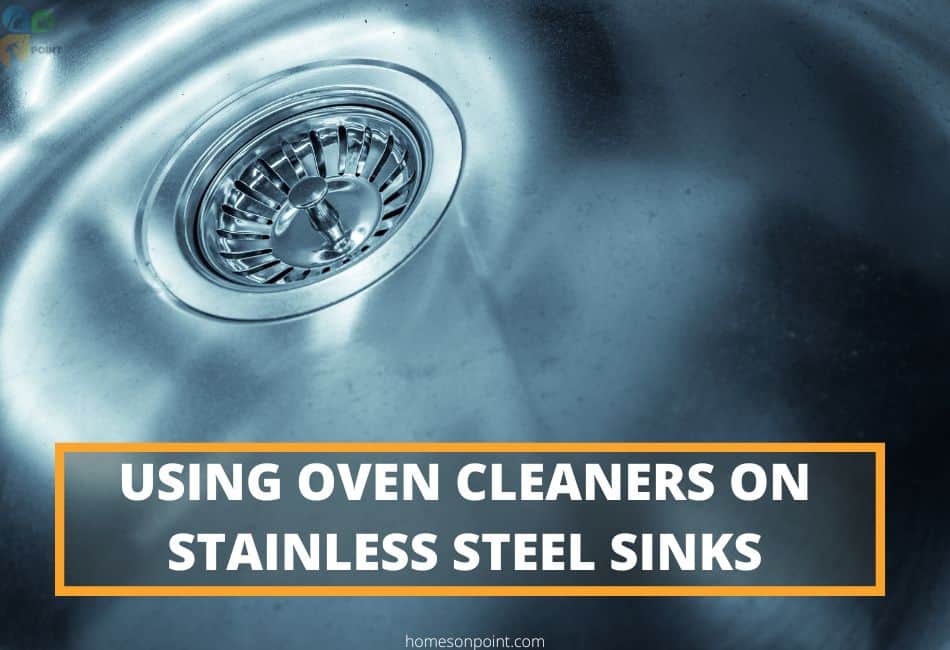Stainless steel is best known for its ability to resist rust and corrosion, making it a popular choice for appliances and sink fixtures in the kitchen. But what about when it comes to cleaning? Can you use oven cleaner on the stainless steel sink?
The short answer is no. Oven cleaners are incredibly corrosive and will damage the finish of your stainless steel sink. In fact, any harsh chemicals should be avoided as they can cause long-term damage.
In an effort to find the right ways to clean a stainless steel sink, there are certain cleaning products that you should definitely avoid. Any kind of oven cleaner, for example, is a huge no-no.
Why Oven Cleaners Are Not Recommended For Cleaning Stainless Steel Sinks
Oven cleaners are specifically designed to clean ovens, and they are usually very effective at doing so. Oven cleaners are generally effective in cleaning ovens because of their high alkalinity. Alkaline cleaners break down grease, fat, and carbon deposits on contact. The high pH causes a chemical reaction that breaks the bonds between the dirt and the surface being cleaned. This makes it possible to remove baked-on grime with little or no scrubbing. They help to remove tough stains that regular cleaning products may not be able to remove.
While oven cleaners may be good at cleaning ovens, they are not recommended for cleaning stainless steel sinks. The high alkalinity of oven cleaners can damage the finish of your stainless steel sink. As indicated earlier, oven cleaners contain caustic chemicals that can etch the surface of your stainless steel sink. Etching is a process where the chemicals in the cleaner remove a small layer of the metal, making the sink more susceptible to corrosion.
One might argue why it’s okay to use oven cleaner on the stainless steel inside the oven if it’s not okay to use it on the outside stainless steel sink. The main difference is that the oven is made of thicker gauge steel which is more resistant to caustic chemicals. In addition, the oven is coated with a heat-resistant enamel that protects it from etching.
Stainless steel used for kitchen sinks contains ordinary steel and some other metals like chromium. When the chromium oxidizes, it creates a thin film that protects the steel from rust and corrosion. One feature of the chromium oxide film is its self-healing. If the film is scratched or damaged, it will quickly repair itself. This is why stainless steel is resistant to rust and corrosion.
While this is a great feature, it’s also one that can be easily damaged by oven cleaners. The caustic chemicals in oven cleaners can remove the chromium oxide film and destroys the self-healing properties. This leaves the sink vulnerable to rust and corrosion.
Effects Of Using Oven Cleaners On Stainless Steel Sink
Using oven cleaner on your stainless steel sink can cause a number of problems as mentioned earlier. Here is a summary of the effects it can have on your sink.
1. Discoloration
The discoloration of the sink is one of the most common problems that occur when using oven cleaners on stainless steel sinks. The chemicals in oven cleaners can cause the finish of your stainless steel sink to become dull and discolored. In some cases, it can even cause the finish to become blotchy. This will leave you with a sink that looks old and worn.
2. Rusting And Corrosion
Another problem that can occur is corrosion. As mentioned earlier, the caustic chemicals in oven cleaners can remove a small layer of metal from your stainless steel sink. This can make the sink more susceptible to corrosion. Once the underneath metal is exposed, it set a breeding ground for rust. Remember it is “stain-resistant” not “stain-impossible”.
3. Formation Of Pits
Pits are small indentations that form on the surface of the sink. They are caused by the chemicals in the oven cleaner eating away at the metal. These pits can collect dirt and grime, making it difficult to keep the sink clean. In addition, the pits can also cause the sink to become discolored and also fuel the formation of rust. There is also the danger of your stainless sink developing scratch marks.
Alternatives To Oven Cleaner For Cleaning Stainless Steel Sinks
While oven cleaners are not recommended for cleaning stainless steel sinks, there are a number of alternative products that you can use. Here are 2 of the best ways to clean a stainless steel sink:
1. Using dish soap and warm water
2. Using white vinegar solution
Using Dish Soap And Warm Water To Clean Stainless Steel Sinks
One of the best ways to clean a stainless steel sink is by using soap and warm water. This is the most basic way to clean your sink. This method is gentle and will not damage the finish of your sink. In addition, it is also very effective in removing dirt and grime. The warm water will help to loosen the dirt and grime while the soap will help to break it down.
You’ll need the following supplies:
- Dish soap
- Warm water
- Sponge or cleaning cloth
Instructions:
- To clean your sink using this method, start by pouring some hot water into the sink. This will help to loosen the dirt and grime. It will even clean up some of the tougher stains and also help remove any clog in the sink drain.
- Add a small amount of dish soap to the sponge or cleaning cloth, dip it into the water and then start scrubbing the sink. Pay special attention to areas that are stained or have a lot of dirt and grime. Remember not to use a scourer as this can damage the finish of your sink.
- Once you have scrubbed the entire sink, rinse it off with some warm water. You can then use a clean cloth to dry it off. That’s it. Your sink should be sparkling clean.
Using White Vinegar Solution To Clean Stainless Steel Sinks
Another effective way to clean your stainless steel sink is by using a white vinegar solution. White vinegar is known for its ability to remove dirt, grime, and stains. In addition, it is also effective in removing water spots.
The acidic nature of white vinegar also helps to remove any build-up on the surface of the sink. This includes soap scum and hard water deposits.
You’ll need the following supplies:
- White vinegar
- Spray bottle
- Microfibre cloth
Instructions:
- Start by mixing equal parts of white vinegar and water in a spray bottle.
- Once the solution is mixed, spray it onto the surface of the sink. Make sure to cover the entire sink and leave the solution on for a few minutes
- Wipe it off with a microfiber cloth. For tough stains, you may need to scrub the area with a sponge soft sponge.
- Once you have wiped off the solution, rinse the sink with some warm water. You can then use a clean cloth to dry it off. Your sink should now be clean and free of any dirt, grime, or stains.
What Other Cleaners Shouldn’t Be Used On Stainless Steel Sinks
Aside from oven cleaners which shouldn’t be used on stainless steel sinks, there are a number of other cleaning products that you should avoid using. These include:
- Scouring pads
- Steel wool
- Bleach
- Other chlorine products
- Cleaners that contain ammonia
While these products may be effective in cleaning other surfaces, they should not be used on stainless steel sinks. They will surely do the job of removing stains on your sink but they will leave you with a damaged and dull sink in the end. Avoid these common mistakes when cleaning your sink.
Final Words
When we are faced with hard-to-remove stains, it is common to assume that some products that work to remove stubborn stains on other surfaces can also be used on stainless steel sinks. Unfortunately, this is not always the case. As we have seen, oven cleaners should never be used on stainless steel sinks.
So, the next time you are cleaning your stainless steel sink, be sure to use only gentle cleaning methods and products. This will help to keep your sink looking shiny and new for years to come. Thanks for reading.

